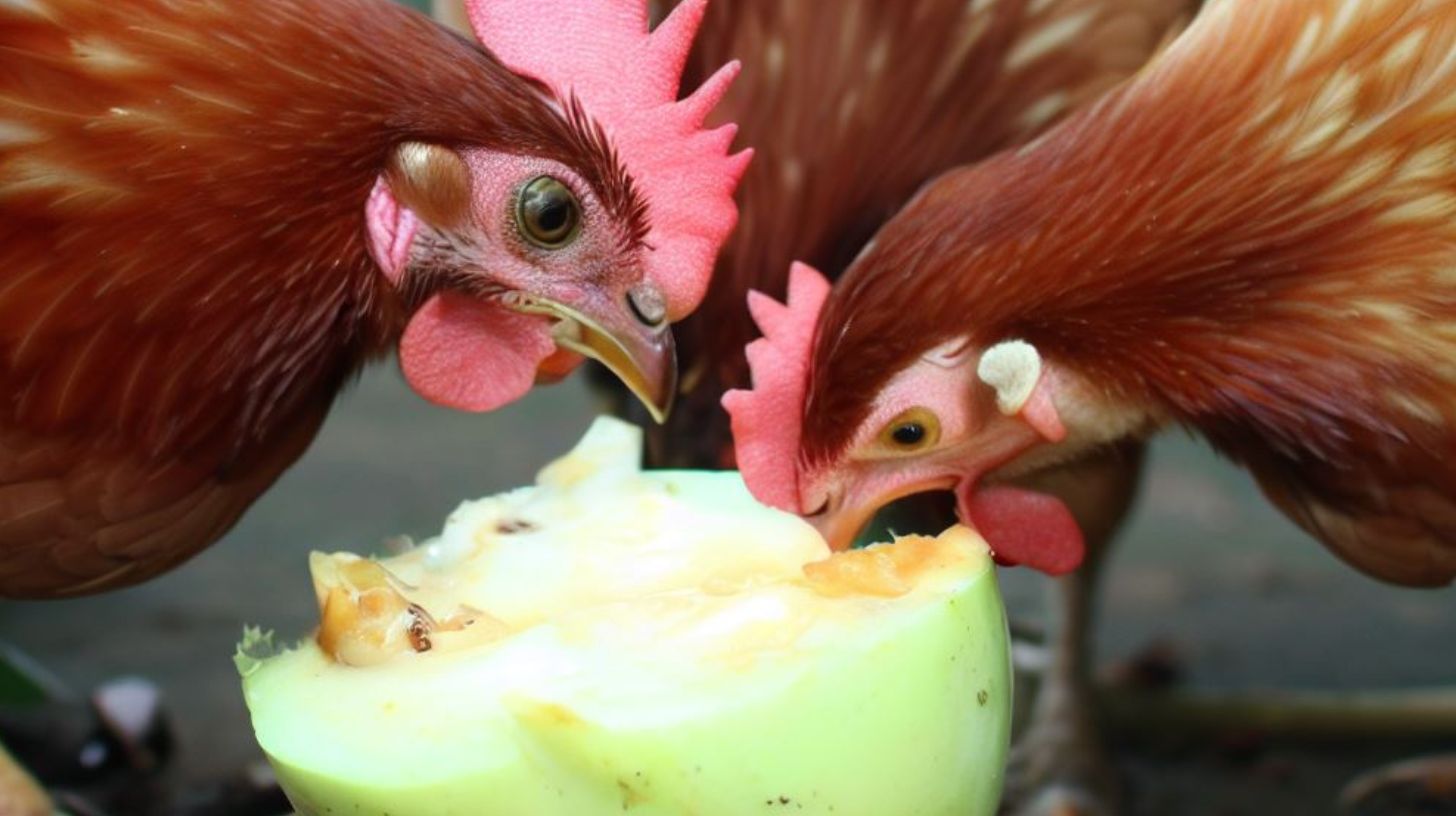Can Chickens Eat Guava? Discover the Answer and Benefits

Table of content:
- Can Chickens Eat Guava Fruit?
- What Are the Benefits of Feeding Guava to Chickens?
- How Much Guava Should I Feed My Chickens?
- Will Guava Upset My Chicken’s Stomach?
- Do Chickens Like the Taste of Guavas?
- Should Guava Be Fed to Chickens as a Treat or Daily?
- Is the Skin and Seeds of Guavas Safe for Chickens?
- Can Guava Help Produce More Eggs from Chickens?
- Are There Any Risks to Feeding Guava to Chickens?
- Final Thoughts
Guava is a sweet, tropical fruit that is popular in many parts of the world. It is known for being high in vitamin C, fiber, and other important nutrients. Some backyard chicken owners wonder if they can share this nutritious fruit with their flock. Here’s what you need to know about feeding guava to chickens.
Can Chickens Eat Guava Fruit?
Yes, chickens can safely eat guava fruit in moderation. Both the flesh and skin of ripe guavas contain beneficial nutrients and antioxidants. The seeds and pits should be removed though as they can pose a choking hazard.
Guava has a sweet, musky flavor that chickens tend to enjoy. It can be fed to them fresh or dried as a healthy treat. Just avoid allowing chickens to overindulge on guavas as too much can lead to loose droppings.
What Are the Benefits of Feeding Guava to Chickens?
Guava offers some great nutritional benefits for a chicken’s diet. Here are some of the main perks:
- High in vitamin C – promotes immunity and egg production
- Excellent source of fiber – aids digestion
- Contains lycopene and other antioxidants – supports health
- Has vitamin A, vitamin B6, niacin, and other B vitamins – important for energy and metabolism
- Provides minerals like potassium, magnesium, and manganese – helps bone and muscle function
The nutrients and plant compounds in guava can help boost chickens’ overall wellbeing and egg-laying capabilities when fed in moderation.
How Much Guava Should I Feed My Chickens?
Guava should be fed as an occasional treat to chickens. About 1-2 slices 2-3 times per week is sufficient.
For a daily treat, offer a few thin slices or chunks of guava for each chicken. As a general rule, the treat shouldn’t exceed 10% of their total daily food intake.
Monitor how much gets consumed. All pieces should get eaten within 10-15 minutes. Leftovers should be removed to prevent spoilage. Adjust portions as needed so you don’t overfeed.
Will Guava Upset My Chicken’s Stomach?
Guava has a lot of natural sugar. Eating too much could lead to loose droppings. Diarrhea or an upset stomach is possible if chickens overindulge.
To avoid digestive issues, introduce guava slowly and in moderation. Only feed a few slices at a time. Provide plenty of fresh water too.
Discontinue use if any chickens develop diarrhea after eating it. Allow their systems to reset before trying again.
Overall though, most chickens tolerate fresh guava just fine when fed responsibly.
Do Chickens Like the Taste of Guavas?
The sweet, tropical flavor of fresh guava is usually a big hit with chickens!
Most hens and roosters will eagerly gobble up this juicy fruit. Some may initially be hesitant with new foods but quickly develop a taste for it.
The flesh is soft, creamy, and easy for chickens to chew and digest. It makes a nice change from their regular feed.
Some ways to serve it include:
- Diced fresh guava chunks
- Thin slices of fresh guava
- Dried guava pieces
Offer pieces in a shallow dish or scatter them in their run to encourage natural foraging behaviors.
Should Guava Be Fed to Chickens as a Treat or Daily?
Guava is best fed to chickens in moderation 2-3 times per week as a treat. It should not be a daily part of their diet.
Offer small portions a few times a week to give them something fun to peck at without providing too many extra calories. Think of guava as a “sometimes food” for chickens.
Feeding too much on a daily basis can lead to health issues like obesity, diarrhea, digestive trouble, and more. Moderation is key.
Is the Skin and Seeds of Guavas Safe for Chickens?
The flesh, skin, and seeds of a ripe guava are all edible for chickens. However, the hard pits pose a potential choking risk and should be removed before feeding.
The skin contains beneficial fiber and nutrients chickens can utilize. But you may want to peel it if the guavas were treated with any pesticides or chemicals during growth.
For convenience, cut guavas into thin slices and use a paring knife to easily remove the central seeds and any remnants. Then chickens get all the advantages without the hazards.
Can Guava Help Produce More Eggs from Chickens?
The vitamins, minerals, and antioxidants in guava can positively impact egg production in several ways:
- Vitamin C promotes a healthy immune system and helps defend against stress.
- Fiber aids digestion and nutrient absorption for better nutrition.
- Antioxidants like lycopene support overall wellness.
- Potassium helps regulate fluids and nerve function.
- Folate, niacin, and other B vitamins contribute to energy production.
By supporting nutrient intake and health, moderate portions of guava can help sustain optimal egg production in backyard flocks. The boost won’t be huge, but every little bit counts!
Just don’t overdo it to avoid excess sugar and calories. A few servings weekly as a treat is sufficient to see benefits.
Are There Any Risks to Feeding Guava to Chickens?
There are a few potential risks to keep in mind:
- Overeating – Too much guava can cause weight gain and diarrhea. Monitor portions.
- Choking hazards – The hard pits/seeds must be removed to prevent choking.
- Sugar content – Excessive sugar intake from too much fruit can be unhealthy.
- Allergies – Rarely, some chickens may be allergic or intolerant to guava.
As long as you feed guava moderately, remove the pits, and monitor for any signs of adverse reactions, the risks are low.
Discontinue use if any chicken shows signs of an allergy or negative effects from it. But most tolerate it well in small amounts as an occasional treat.
Final Thoughts
When fed responsibly, fresh guava can be a safe, nutritious, and appealing supplement for backyard chicken flocks. A few slices 2-3 times per week provides beneficial nutrients, vitamins, minerals, fiber, antioxidants, and more without going overboard.
Be sure to introduce guava slowly, remove all hard seeds, watch for signs of diarrhea or tummy troubles, and adjust portions as needed. Focus on moderation.
Offer just a few pieces at a time and chickens will eagerly enjoy this sweet and juicy tropical fruit as a healthy treat!
Welcome. I’m Adreena Shanum, the proud owner of this website, and I am incredibly passionate about animals, especially poultry. I founded adreenapets.com as a labor of love, stemming from my desire to share my knowledge and experiences with poultry enthusiasts worldwide.




